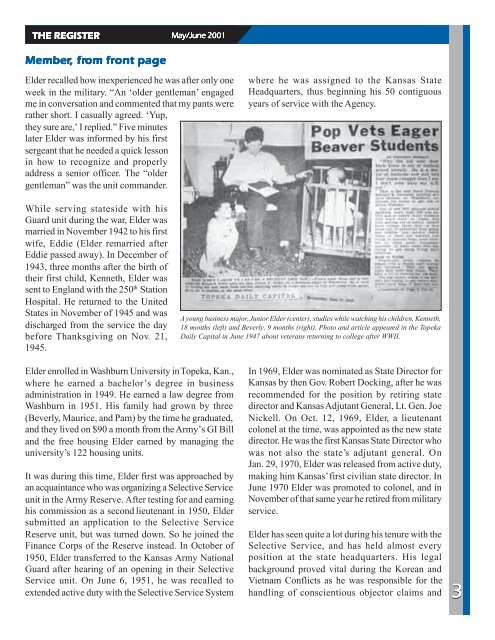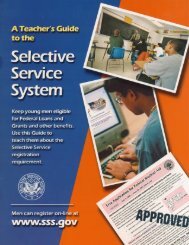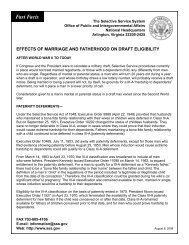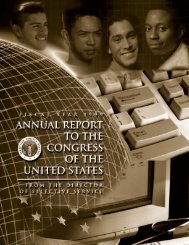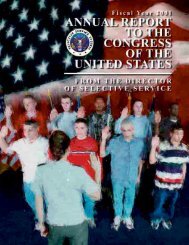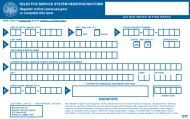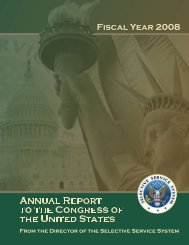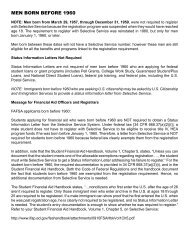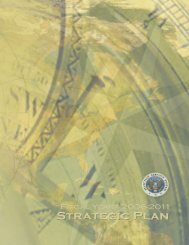The Register-May June 2001 - Selective Service System
The Register-May June 2001 - Selective Service System
The Register-May June 2001 - Selective Service System
Create successful ePaper yourself
Turn your PDF publications into a flip-book with our unique Google optimized e-Paper software.
THE REGISTER <strong>May</strong>/<strong>June</strong> <strong>2001</strong><br />
Member, , from front page<br />
Elder recalled how inexperienced he was after only one<br />
week in the military. “An ‘older gentleman’ engaged<br />
me in conversation and commented that my pants were<br />
rather short. I casually agreed. ‘Yup,<br />
they sure are,’ I replied.” Five minutes<br />
later Elder was informed by his first<br />
sergeant that he needed a quick lesson<br />
in how to recognize and properly<br />
address a senior officer. <strong>The</strong> “older<br />
gentleman” was the unit commander.<br />
where he was assigned to the Kansas State<br />
Headquarters, thus beginning his 50 contiguous<br />
years of service with the Agency.<br />
While serving stateside with his<br />
Guard unit during the war, Elder was<br />
married in November 1942 to his first<br />
wife, Eddie (Elder remarried after<br />
Eddie passed away). In December of<br />
1943, three months after the birth of<br />
their first child, Kenneth, Elder was<br />
sent to England with the 250 th Station<br />
Hospital. He returned to the United<br />
States in November of 1945 and was<br />
discharged from the service the day<br />
before Thanksgiving on Nov. 21,<br />
1945.<br />
A young business major, Junior Elder (center), studies while watching his children, Kenneth,<br />
18 months (left) and Beverly, 9 months (right). Photo and article appeared in the Topeka<br />
Daily Capital in <strong>June</strong> 1947 about veterans returning to college after WWII.<br />
Elder enrolled in Washburn University in Topeka, Kan.,<br />
where he earned a bachelor’s degree in business<br />
administration in 1949. He earned a law degree from<br />
Washburn in 1951. His family had grown by three<br />
(Beverly, Maurice, and Pam) by the time he graduated,<br />
and they lived on $90 a month from the Army’s GI Bill<br />
and the free housing Elder earned by managing the<br />
university’s 122 housing units.<br />
It was during this time, Elder first was approached by<br />
an acquaintance who was organizing a <strong>Selective</strong> <strong>Service</strong><br />
unit in the Army Reserve. After testing for and earning<br />
his commission as a second lieutenant in 1950, Elder<br />
submitted an application to the <strong>Selective</strong> <strong>Service</strong><br />
Reserve unit, but was turned down. So he joined the<br />
Finance Corps of the Reserve instead. In October of<br />
1950, Elder transferred to the Kansas Army National<br />
Guard after hearing of an opening in their <strong>Selective</strong><br />
<strong>Service</strong> unit. On <strong>June</strong> 6, 1951, he was recalled to<br />
extended active duty with the <strong>Selective</strong> <strong>Service</strong> <strong>System</strong><br />
In 1969, Elder was nominated as State Director for<br />
Kansas by then Gov. Robert Docking, after he was<br />
recommended for the position by retiring state<br />
director and Kansas Adjutant General, Lt. Gen. Joe<br />
Nickell. On Oct. 12, 1969, Elder, a lieutenant<br />
colonel at the time, was appointed as the new state<br />
director. He was the first Kansas State Director who<br />
was not also the state’s adjutant general. On<br />
Jan. 29, 1970, Elder was released from active duty,<br />
making him Kansas’ first civilian state director. In<br />
<strong>June</strong> 1970 Elder was promoted to colonel, and in<br />
November of that same year he retired from military<br />
service.<br />
Elder has seen quite a lot during his tenure with the<br />
<strong>Selective</strong> <strong>Service</strong>, and has held almost every<br />
position at the state headquarters. His legal<br />
background proved vital during the Korean and<br />
Vietnam Conflicts as he was responsible for the<br />
handling of conscientious objector claims and<br />
3


